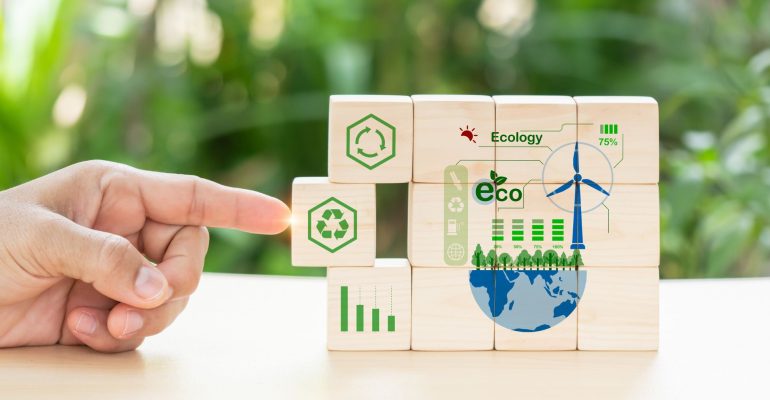Sustainable Tech Innovations Driving Eco-Friendly Businesses
Introduction:
In an era where environmental concerns are at the forefront of global conversations, businesses are increasingly recognizing the importance of adopting sustainable practices. Technology, often seen as a contributor to environmental issues, is now playing a pivotal role in driving ecofriendly initiatives. This blog explores the sustainable tech innovations that are reshaping businesses and helping them contribute to a greener, more sustainable future.
1. Advanced Energy Storage:
Energy storage technologies are critical for maximizing the potential of renewable energy sources like solar and wind. Innovations in battery technologies, such as lithiumion batteries and emerging technologies like solidstate batteries, are enhancing energy storage capacity and efficiency. These advancements contribute to more reliable and sustainable energy systems.
2. Smart Grids and Energy Management:
Smart grids leverage advanced communication and control technologies to optimize the generation, distribution, and consumption of energy. Through realtime monitoring and analytics, smart grids enable more efficient energy use, reduce wastage, and enhance the integration of renewable energy sources into existing power grids.
3. Carbon Capture and Storage (CCS):
CCS technologies aim to capture carbon dioxide emissions from industrial processes and power plants, preventing them from entering the atmosphere. Innovations in CCS include more efficient capture methods, costeffective storage solutions, and novel approaches such as direct air capture. These technologies play a crucial role in mitigating climate change by reducing greenhouse gas emissions.
4. Biodegradable Materials and Packaging:
Sustainable tech is revolutionizing material science with the development of biodegradable and compostable materials. Innovations include plantbased plastics, mushroombased packaging, and other alternatives that break down naturally, reducing the environmental impact of traditional plastics. These materials help address the issue of plastic pollution and contribute to a more circular economy.
5. Precision Agriculture:
Precision agriculture utilizes technology, such as sensors, drones, and data analytics, to optimize farming practices. By precisely monitoring and managing crop conditions, water usage, and fertilizer application, precision agriculture minimizes environmental impact while maximizing crop yields. This sustainable approach enhances resource efficiency and reduces the ecological footprint of agriculture.
6. Green Building Technologies:
Innovations in green building technologies focus on creating energyefficient and environmentally friendly structures. This includes advancements in sustainable construction materials, smart building systems for energy management, and the integration of renewable energy sources within buildings. Green building technologies contribute to reduced energy consumption and lower carbon emissions in the construction industry.
7. Water Purification Technologies:
Sustainable tech innovations in water purification address the global challenge of clean water scarcity. Technologies like membrane filtration, desalination, and water purification using solar energy are making strides in providing access to safe and clean water. These innovations play a crucial role in sustainable water management and conservation.
8. Circular Fashion Technologies:
In the fashion industry, circular fashion technologies focus on reducing waste and promoting a more sustainable lifecycle for clothing. Innovations include recycling technologies for textiles, sustainable dyeing methods, and blockchainbased systems for transparent and traceable supply chains. These technologies support the shift towards a circular economy in the fashion sector.
9. Electric and Autonomous Vehicles:
The automotive industry is experiencing a significant shift towards sustainability with the development of electric vehicles (EVs) and autonomous driving technologies. EVs reduce dependence on fossil fuels, lower carbon emissions, and contribute to cleaner air. Additionally, autonomous driving technologies can optimize traffic flow, reducing fuel consumption and emissions.
10. Sustainable Artificial Intelligence (AI):
As AI becomes more prevalent in various industries, there is a growing focus on developing sustainable AI solutions. This includes optimizing algorithms for energy efficiency, using AI for environmental monitoring and conservation, and applying machine learning to enhance resource management practices.
Conclusion:
These innovations collectively contribute to a more sustainable and environmentally conscious future. As technology continues to advance, the intersection of innovation and sustainability holds the promise of addressing global environmental challenges and fostering a greener, more resilient world. The integration of all these sustainable tech innovations into business operations is not just a trend but a necessity for the future. As the global community strives to combat climate change and protect the environment, businesses play a crucial role in driving these efforts. By embracing renewable energy, implementing energy-efficient technologies, adopting circular economy practices, leveraging data analytics, promoting green transportation, and reducing waste, businesses can position themselves as leaders in the transition towards a more sustainable and eco-friendly future. Embracing these technologies not only benefits the planet but also presents new opportunities for innovation, cost savings, and long-term business success.






